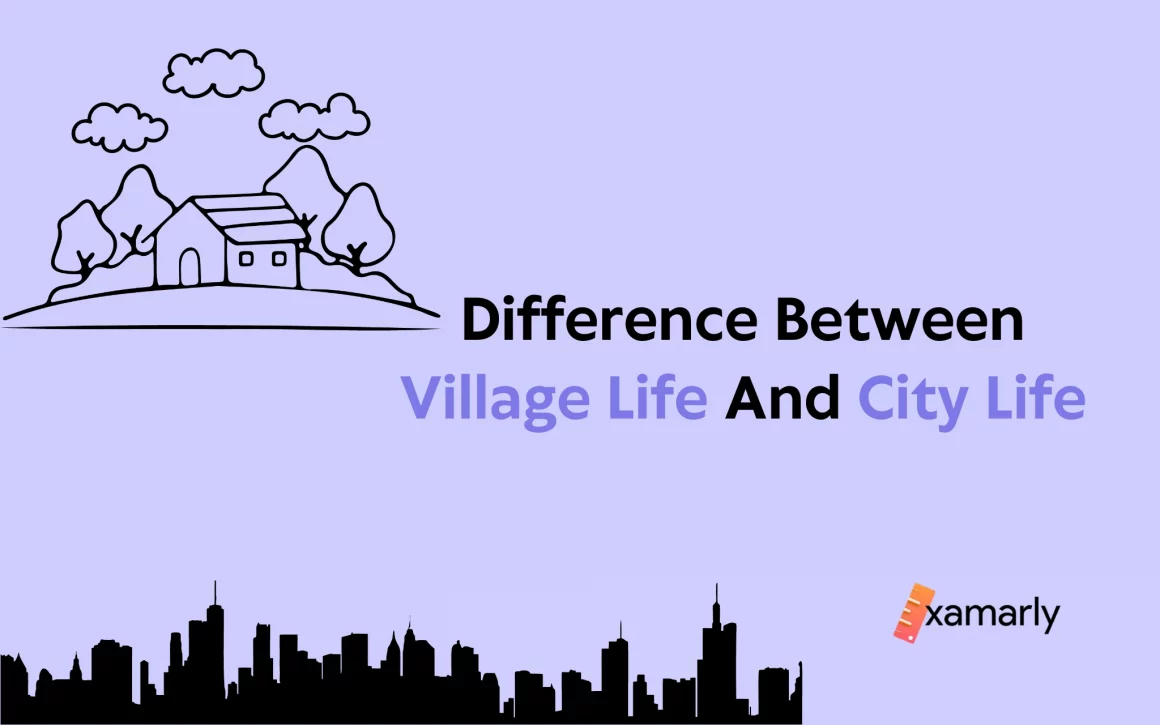An Overview
Village life and city life are two different ways of living that have their own set of advantages and disadvantages. Village life is considered to be a more traditional and simpler way of living, while city life is considered to be more modern and fast-paced. Both have their own unique characteristics and offer different experiences to those who live in them.
In this article, we will discuss the difference between village life and city life in detail, including definitions, key characteristics, and the main differences between the two.
- An Overview
- Definition Of Village Life
- Understanding Village Life In Detail
- Key Characteristics Of Village Life
- Advantages Of Village Life
- Disadvantages Of Village Life
- Definition Of City Life
- Understanding City Life In Detail
- Key Characteristics Of City Life
- Advantages Of City Life
- Disadvantages Of City Life
- The Difference Between Village Life And City Life
- Summing Up
- FAQs Related To The Difference Between Village Life and City Life
- What is the main difference between village life and city life?
- What are the main advantages of village life?
- What are the main disadvantages of village life?
- What are the main advantages of city life?
- What are the main disadvantages of city life?
- Is village life or city life better for families?
- Is village life or city life better for retirees?
- Which one is more affordable, village life or city life?
- Which one is more diverse, village life or city life?
- Which one is more convenient, village life or city life?
Definition Of Village Life
Village life refers to the way of living in rural areas, typically in small communities where people live in close proximity to each other. Villages are usually located far from cities and are characterised by a simpler way of life, with fewer facilities and amenities than cities. People in villages typically rely on agriculture and other traditional forms of livelihood, such as animal husbandry and fishing.
Understanding Village Life In Detail
Village life is generally considered to be more peaceful and relaxed than city life. People in villages lead a simple life, have a strong sense of community and tend to be more closely connected to one another. They are also more closely connected to nature, as they are surrounded by greenery and have access to fresh air and clean water.
Villages are typically home to small, closely-knit communities, where people know each other well and look out for one another. This strong sense of community is one of the main advantages of village life, as it provides a sense of security and belonging.
Life in villages also tends to be more affordable than in cities, as the cost of living is generally lower. People in villages typically have smaller homes and gardens, and the community tends to be more self-sufficient, with people growing their own food and trading with one another.
Despite the many advantages of village life, there are also some disadvantages. Villages tend to be less developed than cities, and so they lack many of the facilities and amenities that city dwellers take for granted, such as hospitals, schools, and supermarkets. This can make life in a village more difficult, especially for people with disabilities or chronic health conditions.
Key Characteristics Of Village Life
- Small and closely-knit communities: Villages are typically home to small communities where people know each other well and look out for one another.
- A traditional and simpler way of living: Village life is characterised by a simpler way of life, with fewer facilities and amenities than in cities.
- Reliance on agriculture and traditional forms of livelihood: People in villages typically rely on agriculture and other traditional forms of livelihood, such as animal husbandry and fishing.
- Closer connection to nature: Villages are typically surrounded by greenery and have access to fresh air and clean water.
- Strong cultural heritage: Villages tend to have a strong cultural heritage and village people hold onto traditional moral values.
- Peaceful and relaxed environment: Village life is generally considered to be more peaceful and relaxed than city life.
- Affordable cost of living: Villages tend to be more affordable than cities, as the cost of living is generally lower.
Advantages Of Village Life
- Peaceful and relaxed environment: Village life is generally considered to be more peaceful and relaxed than city life. People in villages have a slower pace of life and tend to be more closely connected to nature.
- Strong sense of community: Villages are typically home to small, closely-knit communities, where people know each other well and look out for one another. This strong sense of community is one of the main advantages of village life, as it provides a sense of security and belonging.
- Affordable cost of living: Villages tend to be more affordable than cities, as the cost of living is generally lower. People in villages typically have smaller homes and gardens, and the community tends to be more self-sufficient, with people growing their own food and trading with one another.
- Close proximity to nature: Villages are typically surrounded by greenery and have access to fresh air and clean water. This can be beneficial for people who enjoy outdoor activities and want to live in a more natural environment.
- Strong cultural heritage: Villages tend to have a strong cultural heritage and traditional values, which can be beneficial for people who want to experience a different culture or way of life.
Disadvantages Of Village Life
- Limited facilities and amenities: Villages tend to be less developed than cities, and so they lack many of the facilities and amenities that city dwellers take for granted, such as hospitals, schools, and supermarkets.
- Limited job opportunities: Villages tend to have a more limited range of job opportunities, with most people relying on agriculture and other traditional forms of livelihood. This can be a disadvantage for people who want to pursue a different career or are looking for higher-paying jobs.
- Isolation: Village life can be isolating for some people, as they may not have access to the same social and cultural activities that are available in cities.
- Limited access to healthcare: Villages may lack access to modern healthcare facilities, so people may have to travel to nearby towns or cities to receive medical treatment.
- Limited access to technology and internet: Villages may not have access to the same high-speed internet and technology that is available in cities. This can be a disadvantage for people who rely on technology for work or communication.
Definition Of City Life
City life refers to the way of living in urban areas, typically in large communities where people live in close proximity to one another. Cities are characterised by a fast-paced and modern way of life, with a wide range of facilities and amenities available to residents. People in cities typically rely on a variety of forms of livelihood, including white-collar jobs, small businesses, and service industries.
Understanding City Life In Detail
City life is generally considered to be more exciting and dynamic than village life. Cities are home to a diverse range of people and cultures, and this diversity is one of the main advantages of city life. Cities are also home to a wide range of facilities and amenities, such as hospitals, schools, and supermarkets, which makes life in a city more convenient than life in a village.
Cities also tend to be more developed than villages, and this means that there are more job opportunities available. People in cities typically have a wider range of career options and can earn higher salaries than people in villages. This is one of the main reasons why many people choose to move to cities.
Despite the many advantages of city life, there are also some disadvantages. Cities tend to be more expensive than villages, and this can make life in a city more difficult for people on low incomes. Cities also tend to be more polluted and crowded than villages, which can make life in a city more stressful.
Key Characteristics Of City Life
- A fast-paced and modern way of living: Cities are characterised by a fast-paced and modern way of life, with a wide range of facilities and amenities available to residents.
- A diverse range of people and cultures: Cities are home to a diverse range of people and cultures.
- Wide range of job opportunities: Cities tend to be more developed than villages, and this means that there are more job opportunities available.
- Convenient access to facilities and amenities: Cities are typically home to a wide range of facilities and amenities, such as medical facilities, hospitals, schools, shopping malls, and supermarkets, which makes life in a city more convenient.
- High cost of living: Cities tend to be more expensive than villages, with higher costs for housing, transportation, and other necessities.
- Crowded and polluted environment: Cities tend to be more polluted and crowded than villages, which can make life in a city more stressful.
- Constant noise pollution: Cities tend to be noisy, with constant traffic and other noise pollution which can be disruptive to sleep and daily activities.
Advantages Of City Life
- Variety of job opportunities: Cities tend to be more developed than villages, and this means that there are more job opportunities available. People in cities typically have a wider range of career options and can earn higher salaries than people in villages.
- Convenient access to facilities and amenities: Cities are typically home to a wide range of facilities and amenities, such as hospitals, schools, and supermarkets, which makes life in a city more convenient.
- Cultural diversity: Cities are home to a diverse range of people and cultures, which can be an advantage for people who enjoy experiencing different cultures or ways of life.
- Access to entertainment and activities: Cities tend to have a wider range of entertainment and recreational activities available, such as theatres, museums, and sports teams.
- Access to education: Cities tend to have more universities and colleges than villages, providing a wider range of educational opportunities.
Disadvantages Of City Life
- High cost of living: Cities tend to be more expensive than villages, with higher costs for housing, transportation, and other necessities.
- Crowded and polluted environment: Cities tend to be more polluted with critical air pollution and crowded than villages, which can make life in a city more stressful.
- Lack of community and privacy: Cities can be anonymous and impersonal, making it more difficult to develop a sense of community and privacy
- Traffic and congestion: Cities tend to have more traffic and congestion than villages, making it more difficult to get around.
- Noise pollution: Cities tend to be noisy, with constant traffic and other noise pollution, which can be disruptive to sleep and daily activities.
The Difference Between Village Life And City Life
Life in a village and life in a city both have their own unique characteristics that set them apart. Some of the major differences have been mentioned below.
- The first main difference between village life and city life is the pace of life. Village life is generally considered to be more peaceful and relaxed than city life. People in villages have a slower pace of life and tend to be more closely connected to nature. They are also more closely connected to one another, as they are surrounded by a small, closely-knit community. On the other hand, city life is fast-paced and can be stressful, with people rushing from one place to another. The hustle and bustle of city life can be overwhelming for some people.
- The second main difference between village life and city life is the cost of living. Villages tend to be more affordable than cities, as the cost of living is generally lower. People in villages typically have smaller homes and gardens, and the community tends to be more self-sufficient, with people growing their own food and trading with one another. In contrast, cities tend to be more expensive, with higher costs for housing, transportation, and other necessities.
- The third main difference between village life and city life is the availability of facilities and amenities. Villages tend to be less developed than cities, and so they lack many of the facilities and amenities that city dwellers take for granted, such as hospitals, schools, and supermarkets. This can make life in a village more difficult, especially for people with disabilities or chronic health conditions. On the other hand, cities are typically home to a wide range of facilities and amenities, such as hospitals, schools, and supermarkets, which makes life in a city more convenient.
- The fourth main difference between village life and city life is the job opportunities. Cities tend to be more developed than villages, and this means that there are more job opportunities available. People in cities typically have a wider range of career options and can earn higher salaries than people in villages. This is one of the main reasons why many people choose to move to cities. In contrast, villages tend to have a more limited range of job opportunities, with most people relying on agriculture and other traditional forms of livelihood.
- The fifth main difference between village life and city life is the environment. Villages are typically surrounded by greenery and have access to fresh air and clean water. They are also generally quieter and less polluted than cities. On the other hand, cities tend to be more polluted and crowded, which can make life in a city more stressful.
The table given below highlights more differences between village life and city life in a comprehensive manner.
| Factors For Comparison | Village Life | City Life |
| Language | Typically one language spoken | Multilingual |
| Food | Traditional and locally grown | Diverse and cosmopolitan |
| Transport | Less developed, primarily by foot or bicycle | More developed, with options such as public transport and cars |
| Social Life | A close-knit community, with strong social bonds | Diverse and dynamic, but may lack a sense of community |
| Ambience | Peaceful and relaxed | Fast-paced and hectic |
| Infrastructure | Limited infrastructure and facilities | More developed infrastructure and facilities |
| People | Small population, often with shared cultural heritage | Diverse population with varying cultural backgrounds |
| Entertainment | Limited options, typically traditional and community-based | Wide range of options, including theatres, museums, and sports teams |
| Education | Limited educational opportunities | More educational opportunities, including universities and colleges |
| Employment Opportunities | Limited job opportunities | A wider range of job opportunities |
| Pollution | Less polluted | More polluted |
| Medical Facilities | Limited medical facilities | More developed medical facilities |
| Culture | Strong cultural heritage and traditional values | Diverse cultural backgrounds and modern influences |
Summing Up
In conclusion, village life and city life are two different ways of living that have their own set of advantages and disadvantages.
Village life is generally considered to be more peaceful and relaxed, with a slower pace of life and a stronger sense of community. City life is generally considered to be more exciting and dynamic, with a wider range of job opportunities and facilities and amenities. However, it can also be more stressful and expensive.
Ultimately, the choice between village life and city life depends on an individual’s personal preferences and needs.
Check Out Our Recent Blogs:
| Writ Of Prohibition In India | Difference Between Socialism and Democracy |
| Right to Equality | Difference Between Socialism and Democracy |
FAQs Related To The Difference Between Village Life and City Life
What is the main difference between village life and city life?
The main difference between village life and city life is the pace of life, with village life being more peaceful and relaxed, and city life being more fast-paced and stressful.
What are the main advantages of village life?
The main advantages of village life include a peaceful and relaxed environment, a strong sense of community, an affordable cost of living, and a closer connection to nature.
What are the main disadvantages of village life?
The main disadvantages of village life include limited facilities and amenities, limited job opportunities, isolation, and limited access to healthcare.
What are the main advantages of city life?
The main advantages of city life include a wide range of job opportunities, convenient access to facilities and amenities, cultural diversity, and access to entertainment and activities.
What are the main disadvantages of city life?
The main disadvantages of city life include a high cost of living, a crowded and polluted environment, a lack of community and privacy, traffic and congestion, and noise pollution.
Is village life or city life better for families?
It depends on personal preferences and needs. Village life may be better for families who want a peaceful and relaxed environment, while city life may be better for families who want access to a wide range of job opportunities and facilities and amenities.
Is village life or city life better for retirees?
It also depends on personal preferences and needs. Village life may be better for retirees who want a peaceful and relaxed environment, while city life may be better for retirees who want access to a wide range of entertainment and recreational activities.
Which one is more affordable, village life or city life?
Villages tend to be more affordable than cities, as the cost of living is generally lower.
Which one is more diverse, village life or city life?
Cities are home to a diverse range of people and cultures, making them more diverse than village life.
Which one is more convenient, village life or city life?
Cities are typically home to a wide range of facilities and amenities, such as hospitals, schools, and supermarkets, which makes life in a city more convenient than village life.





![Diwan i Risalat [Foreign Affairs Department] - Delhi Sultanate 4 Diwan i Risalat](https://blog.examarly.com/wp-content/uploads/2022/08/Diwan-i-Risalat-1-e1676965861513-300x188.webp)
